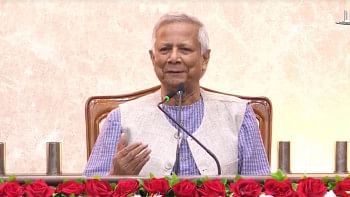Legal water for Dhaka slums next year
Stating that 50 percent of slum dwellers are getting water through the legal supply network, Dhaka Water Supply and Sewerage Authority (DWASA) Managing Director Taqsem A Khan yesterday assured that the rest would be able to avail the facility by December 2017.
Addressing as chief guest a views-exchange meeting at Jatiya Press Club on proposals of citizens for a people-friendly water supply management, he said many of the around 20 percent of the capital's population living in informal settlements were dependent on illegal connections.
The inclusion will ensure people-friendly water management, he added at the programme organised by Nagorik Adhikar Sangrakkhan Forum (Nasaf) with the assistance of Resource Integration Centre and Manusher Jonno Foundation.
One Dhaka North City Corporation councillor, Jahirul Islam Manik, said many people of the low income group were taking illegal connections on failing to get legal ones following standard procedures.
The illegal connections leak and taint the supply, affecting others who subsequently get dirty and malodorous water, he said.
Former secretary general of Bangladesh Federal Union of Journalists Abdul Jalil Bhuiyan said DWASA should keep a separate budget for low income groups, otherwise they would be deprived of their fundamental rights.
He suggested forming a powerful monitoring cell to reduce alleged corruption in DWASA.
Suggesting that DWASA also emphasise improving sewerage network, Stamford University Bangladesh Vice Chancellor Dr M Feroze Ahmed said in many cases, rivers surrounding the capital were being polluted for the poor sewerage network.
He said DWASA took an initiative to bring water from the Meghna and Padma rivers and treat those and it would increase the tariff.
Feroze said the tariff would remain low if DWASA can use water of the rivers surrounding the capital.
AKM Kamruzzaman, on behalf of Nasaf, presented the proposals, including providing zonal support cells for low income groups and slum communities, specific allocations for the latter , low tariffs for low income communities, concessions for slum people and involving citizen groups in the entire service delivery process.
Manusher Jonno Foundation Director Dr Tofail Ahmed moderated the programme.

 For all latest news, follow The Daily Star's Google News channel.
For all latest news, follow The Daily Star's Google News channel. 



Comments